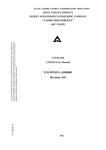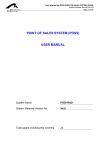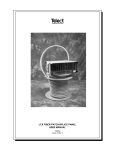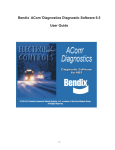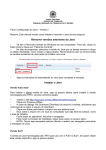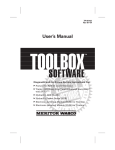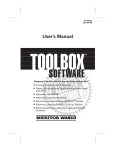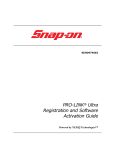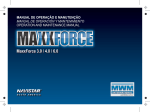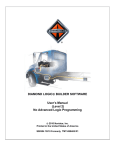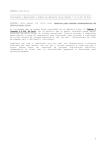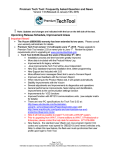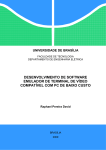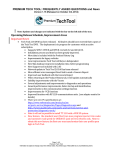Download Print Preview - C:\Users\KELLY~1.MET\AppData\Local\Temp
Transcript
SERVICE MANUAL TRUCK SERVICE MANUAL ServiceMaxx™ User’s Guide EGES-550 September 2011 EGES-550 Read all safety instructions in the "Safety Information" section of this Manual before doing any procedures. Follow all warnings, cautions, and notes. © September 2011 Navistar, Inc. All rights reserved. TRUCK SERVICE MANUAL I Table of Contents Safety Information. . . . . . . . . . . . . . . . . . . . . . . . . . . . . . . . . . . . . . . . . . . . . . . . . . . . . . . . . . . . . . . . . . . . . . . . . . . . . . . . . . . . . . . . . . . . . . . . . . . . . . . . 1 1 ServiceMaxx™ User’s Guide. . . . . . . . . . . . . . . . . . . . . . . . . . . . . . . . . . . . . . .. . . . . . . . . . . . . . . . . . . . . . . . . . . . . . . . . . . . . . . . . 3 EGES-550 Read all safety instructions in the "Safety Information" section of this Manual before doing any procedures. Follow all warnings, cautions, and notes. © September 2011 Navistar, Inc. All rights reserved. II TRUCK SERVICE MANUAL EGES-550 Read all safety instructions in the "Safety Information" section of this Manual before doing any procedures. Follow all warnings, cautions, and notes. © September 2011 Navistar, Inc. All rights reserved. TRUCK SERVICE MANUAL Safety Information Safety Equipment SAFETY INFORMATION • Use correct lifting devices. This manual provides general and specific maintenance procedures essential for reliable engine operation and your safety. Since many variations in procedures, tools, and service parts are involved, advice for all possible safety conditions and hazards cannot be stated. • Use safety blocks and stands. Read safety instructions before doing any service and test procedures for the engine or vehicle. See related application manuals for more information. Obey Safety Instructions, Warnings, Cautions, and Notes in this manual. Not following warnings, cautions, and notes can lead to injury, death or damage to the engine or vehicle. Engine • The engine should be operated or serviced only by qualified individuals. • Provide necessary ventilation when operating engine in a closed area. • Keep combustible material away from engine exhaust system and exhaust manifolds. • Install all shields, guards, and access covers before operating engine. • Do not run engine with unprotected air inlets or exhaust openings. If unavoidable for service reasons, put protective screens over all openings before servicing engine. • Shut engine off and relieve all pressure in the system before removing panels, housing covers, and caps. • If an engine is not safe to operate, tag the engine and ignition key. Safety Terminology Terms are used to stress your safety and safe operation of the engine. Note: A note describes actions necessary for correct, efficient operation. Work Area • Keep work area clean, dry, and organized. Fire Prevention • Keep tools and parts off the floor. • • Make sure the work area is ventilated and well lit. • Make sure a First Aid Kit is available. Protective Measures 1 Make sure charged fire extinguishers are in the work area. NOTE: Check the classification of each fire extinguisher to make sure that the following fire types can be extinguished. • Wear protective safety glasses and shoes. 1. Type A — Wood, paper, textiles, and rubbish • Wear correct hearing protection. 2. Type B — Flammable liquids • Wear cotton work clothing. 3. Type C — Electrical equipment • Wear sleeved heat protective gloves. Batteries • Do not wear rings, watches or other jewelry. • • Restrain long hair. Always disconnect the main negative battery cable first. • Shift transmission to neutral, set parking brake, and block wheels before doing diagnostic or service procedures. Always connect the main negative battery cable last. • Avoid leaning over batteries. • Protect your eyes. Clear the area before starting the engine. • Do not expose batteries to flames or sparks. • Do not smoke in workplace. Vehicle • • EGES-550 Read all safety instructions in the "Safety Information" section of this Manual before doing any procedures. Follow all warnings, cautions, and notes. © September 2011 Navistar, Inc. All rights reserved. 2 TRUCK SERVICE MANUAL EGES-550 Read all safety instructions in the "Safety Information" section of this Manual before doing any procedures. Follow all warnings, cautions, and notes. © September 2011 Navistar, Inc. All rights reserved. 1 SERVICEMAXX™ USER’S GUIDE 3 Table of Contents 1. ServiceMaxx™ Diagnostic Software. . . . . . . . . . . . . . . . . . . . . . . . . . . . . . . . . . . . . . . . . . . . . . . . . . . . . . . . . . . . . . . . . .. . . . . . . . . . . . . . . 5 1.1. Introduction. . . . . . . . . . . . . . . . . . . . . . . . . . . . . . . . . . . . . . . . . . . . . . .. . . . . . . . . . . . . . . . . . . . . . . . . . . . . . . . . . . . . . . . . . . . . . . . . . 5 1.2. Acronyms. . . . . . . . . . . . . . . . . . . . . . . . . . . . . . . . . . . . . . . . . . . . . . . . . . . . . . . . . . . . . . . . . . . . . . . . . . . . . . . . . . . . . . . . . . . . . . . . . . . 5 2. Installing ServiceMaxx™ Fleet Pro Software. . . . . . . . . . . . . . . . . . . . . . . . . . . . . . . . . . . . . . . . . . . . . . . . . . . . . . . . . . . . . . . . . . . . . . . 2.1. Remove All Versions of JRE 6. . . . . . . . . . . . . . . . . . . . . . . . . . . . . . . . . . . . . . . . . . . . . . . . . . . . . . . . . . . . . . . . . . . . . . . . . . . 2.2. Installing JRE 6 Update 10. . . . . . . . . . . . . . . . . . . . . . . . . . . . . . . . . . . . . . . . . . . . . . . . . . . . . . . . . . . . . . .. . . . . . . . . . . . . . . . . 2.3. Starting ServiceMaxx™ Software From Desktop. . . . . . . . . . . . . . . . . . . . . . . . . . . . . . . . . . . . . . . . . . . . . . . . . . . . . . . 2.4. ServiceMaxx™ Software Updates. . . . . . . . . . . . . . . . . . . . . . . . . . . . . . . . . . . . . . . . . . . . . . . . . . . . . . . . . . . . . . . . . . . . . . . 2.5. Language Change Settings. . . . . . . . . . . . . . . . . . . . . . . . . . . . . . . . . . . . . . . . . . . . . . . . . . . . . . . . . . . . . . . .. . . . . . . . . . . . . . . Windows 7. . . . . . . . . . . . . . . . . . . . . . . . . . . . . . . . . . . . . . . . . . . . . . . . . . . . . . . . . . . . . . . . . . . . . . . . . . . . . . . . . . . . . . . . . . . . . . Windows XP. . . . . . . . . . . . . . . . . . . . . . . . . . . . . . . . . . . . . . . . . . . . . . . . . . . . . .. . . . . . . . . . . . . . . . . . . . . . . . . . . . . . . . . . . . . . 6 6 6 6 7 8 8 9 3. Vehicle Connection. . . . . . . . . . . . . . . . . . . . . . . . . . . . . . . . . . . . . . . . . . . . . . . . . . . . . . . . . . . . . . . . .. . . . . . . . . . . . . . . . . . . . . . . . . . . . . . . . . . .10 3.1. Diagnostic Interface Cable Information. . . . . . . . . . . . . . . . . . . . . . . . . . . . . . . . . . . . . . . . . . . . . . . . . . . . . . . . . . . . . . . . . .10 3.2. Interface Device Selection. . . . . . . . . . . . . . . . . . . . . . . . . . . . . . . . . . . . . . . . . . . . . . . . . . . . . . . . . . . . . . . . . . . . . . . . . . . . . . . .11 3.3. Connecting ServiceMaxx™ Software. . . . . . . . . . . . . . . . . . . . . . . . . . . . . . . . . . . . . . . . . . . . . . . . . . . . . . . . . . . . . . . . . . . .12 4. ServiceMaxx™ Software. . . . . . . . . . . . . . . . . . . . . . . . . . . . . . . . . . . . . . . . .. . . . . . . . . . . . . . . . . . . . . . . . . . . . . . . . . . . . . . . . . . . . . . . . . . . . .13 4.1. Using ServiceMaxx™ Software. . . . . . . . . . . . . . . . . . . . . . . . . . . . . . . . . . . . . . . . . . . . . . . . . . . . . . . . . . . . . . . . . . . . . . . . . .13 4.2. Software Features. . . . . . . . . . . . . . . . . . . . . . . . . . . . . . . . . . . . . . . . . . .. . . . . . . . . . . . . . . . . . . . . . . . . . . . . . . . . . . . . . . . . . . . . .14 4.3. ServiceMaxx™ Service Messages. . . . . . . . . . . . . . . . . . . . . . . . . . . . . . . . . . . . . . . . . . . . . . . . . . . . . . . . . . . . . . . . . . . . . . .15 5. Sessions. . . . . . . . . . . . . . . . . . . . . . . . . . . . . . . . . . . . . . . . . . . . . . . . . . . . .. . . . . . . . . . . . . . . . . . . . . . . . . . . . . . . . . . . . . . . . . . . . . . . . . . . . . . . . . . .16 5.1. Sessions Menu. . . . . . . . . . . . . . . . . . . . . . . . . . . . . . . . . . . . . . . . . . . . . . .. . . . . . . . . . . . . . . . . . . . . . . . . . . . . . . . . . . . . . . . . . . . . .16 5.2. Building a Session. . . . . . . . . . . . . . . . . . . . . . . . . . . . . . . . . . . . . . . . . . .. . . . . . . . . . . . . . . . . . . . . . . . . . . . . . . . . . . . . . . . . . . . . .17 5.3. View and Clear Signal Value Statistics. . . . . . . . . . . . . . . . . . . . . . . . . . . . . . . . . . . . . . . . . . . . . . . . . . . . . . . . . . . . . . . . . .19 5.4. Saving Session Files. . . . . . . . . . . . . . . . . . . . . . . . . . . . . . . . . . . . . . . . .. . . . . . . . . . . . . . . . . . . . . . . . . . . . . . . . . . . . . . . . . . . . .20 5.5. Loading a Saved Session. . . . . . . . . . . . . . . . . . . . . . . . . . . . . . . . . . . . . . . . . . . . . . . . . . . . . . . . . . . . . . . . .. . . . . . . . . . . . . . . .20 5.6. Recording Session Data (Snapshot). . . . . . . . . . . . . . . . . . . . . . . . . . . . . . . . . . . . . . . . . . . . . . . . . . . . . . . . . . . . . . . . . . . . .21 5.7. Triggered Recording. . . . . . . . . . . . . . . . . . . . . . . . . . . . . . . . . . . . . . . . .. . . . . . . . . . . . . . . . . . . . . . . . . . . . . . . . . . . . . . . . . . . . . .22 Trigger Setup. . . . . . . . . . . . . . . . . . . . . . . . . . . . . . . . . . . . . . . . . . . . . . . . . . .. . . . . . . . . . . . . . . . . . . . . . . . . . . . . . . . . . . . . . . .22 Using Triggered Recording. . . . . . . . . . . . . . . . . . . . . . . . . . . . . . . . . . . . . . . . . . . . . . . . . . . . . . . . . . . . . . . . . . . . . . . . . . .23 5.8. Viewing ServiceMaxx™ SnapShots. . . . . . . . . . . . . . . . . . . . . . . . . . . . . . . . . . . . . . . . . . . . . . . . . . . . . . . . . . . . . . . . . . . . .24 6. Viewing Diagnostic Trouble Codes. . . . . . . . . . . . . . . . . . . . . . . . . . . . . . . . . . . . . . . . . . . . . . . . . . . . . . . . . . . . . . . . . . . . . . . . . . . . . . . . . .25 6.1. DTC Window. . . . . . . . . . . . . . . . . . . . . . . . . . . . . . . . . . . . . . . . . . . . . . . . . .. . . . . . . . . . . . . . . . . . . . . . . . . . . . . . . . . . . . . . . . . . . . .25 6.2. DTC Identification. . . . . . . . . . . . . . . . . . . . . . . . . . . . . . . . . . . . . . . . . .. . . . . . . . . . . . . . . . . . . . . . . . . . . . . . . . . . . . . . . . . . . . . . . .25 6.3. Active and Previously Active DTCs. . . . . . . . . . . . . . . . . . . . . . . . . . . . . . . . . . . . . . . . . . . . . . . . . . . . . . . . . . . . . . . . . . . . . .26 6.4. Clearing DTCs. . . . . . . . . . . . . . . . . . . . . . . . . . . . . . . . . . . . . . . . . . . . . . .. . . . . . . . . . . . . . . . . . . . . . . . . . . . . . . . . . . . . . . . . . . . . . .26 7. Parameters. . . . . . . . . . . . . . . . . . . . . . . . . . . . . . . . . . . . . . . . . . . . . . . . . . . . . . . . . . . . . . . . . . . . . . . . . . . . . . . . . . . . . . . . . . . . . . . . . . . . . . . . . . . . .27 7.1. Export Parameters. . . . . . . . . . . . . . . . . . . . . . . . . . . . . . . . . . . . . . . . . . .. . . . . . . . . . . . . . . . . . . . . . . . . . . . . . . . . . . . . . . . . . . . . .27 7.2. View All Parameters. . . . . . . . . . . . . . . . . . . . . . . . . . . . . . . . . . . . . . . . . . . . . . . . . . . . . . . . . . . . . . . . . . . . . . . . . . . . . . . . . . . . . . .27 7.3. Search Parameters by Group. . . . . . . . . . . . . . . . . . . . . . . . . . . . . . . . . . . . . . . . . . . . . . . . . . . . . . . . . . . . . . . . . . . . . . . . . . . .27 7.4. Search Parameters by Keyword(s). . . . . . . . . . . . . . . . . . . . . . . . . . . . . . . . . . . . . . . . . . . . . . . . . . . . . . . . . . . . . . . . . . . . . .28 EGES-550 Read all safety instructions in the "Safety Information" section of this Manual before doing any procedures. Follow all warnings, cautions, and notes. © September 2011 Navistar, Inc. All rights reserved. 4 1 SERVICEMAXX™ USER’S GUIDE 7.5. Change One Dealer or Customer Programmable Parameter. . . . . . . . . . . . . . . . . . . . . . . . . . . . . . . . . . . . . . . . .28 7.6. Drop-Down. . . . . . . . . . . . . . . . . . . . . . . . . . . . . . . . . . . . . . . . . . . . . . . . . .. . . . . . . . . . . . . . . . . . . . . . . . . . . . . . . . . . . . . . . . . . . . . . . .29 7.7. Numerical Value. . . . . . . . . . . . . . . . . . . . . . . . . . . . . . . . . . . . . . . . . . . . .. . . . . . . . . . . . . . . . . . . . . . . . . . . . . . . . . . . . . . . . . . . . . .30 7.8. Change Multiple Dealer or Customer Programmable Parameters. . . . . . . . . . . . . . . . . . . . . . . . . . . . . . . . . . .30 7.9. Undo Parameter Changes Before They Are Programmed. . . . . . . . . . . . . . . . . . . . . . . . . . . . . . . . . . . . . . . . . . . .30 7.10. How to Change the Customer Password. . . . . . . . . . . . . . . . . . . . . . . . . . . . . . . . . . . . . . . . . . . . . . . . . . . . . . . . . . . . . .30 8. Parameter Templates. . . . . . . . . . . . . . . . . . . . . . . . . . . . . . . . . . . . . . . . . . .. . . . . . . . . . . . . . . . . . . . . . . . . . . . . . . . . . . . . . . . . . . . . . . . . . . . . .32 8.1. Creating Parameter Template. . . . . . . . . . . . . . . . . . . . . . . . . . . . . . . . . . . . . . . . . . . . . . . . . . . . . . . . . . . . . . . . . . . . . . . . . . . .32 8.2. Opening Existing Parameter Template. . . . . . . . . . . . . . . . . . . . . . . . . . . . . . . . . . . . . . . . . . . . . . . . . . . . . . . . . . . . . . . . . .32 8.3. Parameter Template Features. . . . . . . . . . . . . . . . . . . . . . . . . . . . . . . . . .. . . . . . . . . . . . . . . . . . . . . . . . . . . . . . . . . . . . . . . . . .33 8.4. Changing Parameter Template Values. . . . . . . . . . . . . . . . . . . . . . . . . . . . . . . . . . . . . . . . . . . . . . . . . . . . . . . . . . . . . . . . . .35 9. Vehicle Trip Report. . . . . . . . . . . . . . . . . . . . . . . . . . . . . . . . . . . . . . . . . . . .. . . . . . . . . . . . . . . . . . . . . . . . . . . . . . . . . . . . . . . . . . . . . . . . . . . . . . . .36 9.1. View Vehicle Trip Report. . . . . . . . . . . . . . . . . . . . . . . . . . . . . . . . . . . . . .. . . . . . . . . . . . . . . . . . . . . . . . . . . . . . . . . . . . . . . . . . . .36 9.2. View Activity Report. . . . . . . . . . . . . . . . . . . . . . . . . . . . . . . . . . . . . . . . . . . . . . . . . . . . . . . . . . . . . . . . . . . . . . . . . . . . . . . . . . . . . . .37 9.3. View Vehicle Events. . . . . . . . . . . . . . . . . . . . . . . . . . . . . . . . . . . . . . . . . . . . . . . . . . . . . . . . . . . . . . . . . . . . . . . . . . . . . . . . . . . . . . .38 9.4. View Trip Data. . . . . . . . . . . . . . . . . . . . . . . . . . . . . . . . . . . . . . . . . . . . . . .. . . . . . . . . . . . . . . . . . . . . . . . . . . . . . . . . . . . . . . . . . . . . . .39 9.5. View Total Data. . . . . . . . . . . . . . . . . . . . . . . . . . . . . . . . . . . . . . . . . . . . . . . . . . . . . . . . . . . . . . . . . . . . . . . . . . . . . . . . . . . . . . . . . . . .40 9.6. Search Trip Data by Keyword(s). . . . . . . . . . . . . . . . . . . . . . . . . . . . . . . . . . . . . . . . . . . . . . . . . . . . . . . . . . . . . . . . . . . . . . . . .41 9.7. Printing Vehicle Trip Reports. . . . . . . . . . . . . . . . . . . . . . . . . . . . . . . . .. . . . . . . . . . . . . . . . . . . . . . . . . . . . . . . . . . . . . . . . . . . .43 9.8. Resetting Vehicle Trip Report. . . . . . . . . . . . . . . . . . . . . . . . . . . . . . . . .. . . . . . . . . . . . . . . . . . . . . . . . . . . . . . . . . . . . . . . . . . .43 10. MWM Session. . . . . . . . . . . . . . . . . . . . . . . . . . . . . . . . . . . . . . . . . . . . . . . . . .. . . . . . . . . . . . . . . . . . . . . . . . . . . . . . . . . . . . . . . . . . . . . . . . . . . . . .44 10.1. MWM Session. . . . . . . . . . . . . . . . . . . . . . . . . . . . . . . . . . . . . . . . . . . . . . . . . . . . . . . . . . . . . . . . . . . . . . . . . . . . . . . . . . . . . . . . . . . .44 11. Print. . . . . . . . . . . . . . . . . . . . . . . . . . . . . . . . . . . . . . . . . . . . . . . . . . . . . . . . . . . . . . . . . . . . . . . . . . . . . . . . . . . . . . . . . . . . . . . . . . . . . . . . . . . . . . . . . . . .46 11.1. Vehicle Information. . . . . . . . . . . . . . . . . . . . . . . . . . . . . . . . . . . . . . . .. . . . . . . . . . . . . . . . . . . . . . . . . . . . . . . . . . . . . . . . . . . . . . .46 11.2. Export Vehicle Data. . . . . . . . . . . . . . . . . . . . . . . . . . . . . . . . . . . . . . . . . . . . . . . . . . . . . . . . . . . . . . . . . . . . . . . . . . . . . . . . . . . . . .46 11.3. Trip Report. . . . . . . . . . . . . . . . . . . . . . . . . . . . . . . . . . . . . . . . . . . . . . . . . . . . . . . . . . . . . . . . . . . . . . . . . . . . . . . . . . . . . . . . . . . . . . . .46 EGES-550 Read all safety instructions in the "Safety Information" section of this Manual before doing any procedures. Follow all warnings, cautions, and notes. © September 2011 Navistar, Inc. All rights reserved. 1 SERVICEMAXX™ USER’S GUIDE 1. ServiceMaxx™ Diagnostic Software NOTE: This section contains a brief overview of ServiceMaxx™ diagnostic software, and was current at the time of publishing. Due to the automatic updating function in ServiceMaxx™ software, screens and functions may differ from this manual. 5 • Detect active modules on various vehicle networks and easily identify communication problems. • Record snapshots of live engine signals to be stored for later playback. • Perform automated diagnostic tests to quickly identify faulty components. 1.1. Introduction Navistar electronically controlled engines have a wide range of standard and optional features. ServiceMaxx™ software provides real-time data monitoring, enhanced diagnostic capabilities, and parameter programming. 1.2. Acronyms • DPF - Diesel Particulate Filter NOTE: To diagnose specific electronic control system failures, always refer to the diagnostic manual for the system being serviced. • DTC - Diagnostic Trouble Code • ECM - Electronic Control Module ServiceMaxx™ diagnostic software provides the capability to: • ESN - Engine Serial Number • EST - Electronic Service Tool • Monitor engine control system input and output signals. • FMI - Failure Mode Indicator • View and program selected Electronic Control Module (ECM) programmable parameters. • NAVCoM - Navistar Advanced Communication Module - dealers only • Display and clear active and previously active Diagnostic Trouble Codes (DTCs). • SPN - Suspect Parameter Number • MIN - Minimum • Create customized diagnostic sessions enhance troubleshooting capabilities. • MAX - Maximum • Display maintenance information such as Total Engine Hours and Total Fuel Used. to Following is a list of acronyms and their meanings used in this document: EGES-550 Read all safety instructions in the "Safety Information" section of this Manual before doing any procedures. Follow all warnings, cautions, and notes. © September 2011 Navistar, Inc. All rights reserved. Vehicle 6 1 SERVICEMAXX™ USER’S GUIDE 2. Installing ServiceMaxx™ Fleet Pro Software 2.3. Starting ServiceMaxx™ Software From Desktop 2.1. Remove All Versions of JRE 6 • Click the Windows® Start menu. • Click Control Panel. • Click Add or Remove Programs. • Remove all versions of Java™ from this menu if different than Java™ 6 Update 26. — Click on the version — Click Change/Remove Figure 1 ServiceMaxx™ Software Desktop Icon 1. Locate the ServiceMaxx™ software icon. The icon is placed on the desktop during the software installation process. — Follow instructions for removal 2.2. Installing JRE 6 Update 10 NOTE: If the JRE 6 Update 10 installation CD is not available, the program can be downloaded from the Internet. Refer to the following steps: 1. Go to http://www.oracle.com/technetwork/java/ javasebusiness/downloads/java-archivedownloads-javase6-419409.html. Figure 2 Windows Start Menu – ServiceMaxx™ Software 2. Click on Java SE Development Kit 6u10. NOTE: Accept License Agreement must be selected before the download will begin. 3. Click on link labeled ire-6u10–windows-i586–p.exe. NOTE: If the ServiceMaxx™ software icon is not available on the desktop, the program can be easily started using the Windows® Start menu. 2. Click on the icon to start ServiceMaxx™ software. 4. Click on Run in pop-up box. 5. Follow on screen installation instructions. After ServiceMaxx™ software is loaded on the computer, the user will need to register the software by calling Nexiq @ 1-877-905-6716, by filling out the Fleet Software Authorization Form and faxing it to (248) 293-8211, or by e-mailing [email protected]. When this form is processed, a password will be provided that enables the software to be used on the corresponding computer. NOTE: ServiceMaxx™ Lite is now available after the registration period expires. ServiceMaxx™ Lite has limited functionality when compared to ServiceMaxx™ Pro. EGES-550 Read all safety instructions in the "Safety Information" section of this Manual before doing any procedures. Follow all warnings, cautions, and notes. © September 2011 Navistar, Inc. All rights reserved. 1 SERVICEMAXX™ USER’S GUIDE 2.4. ServiceMaxx™ Software Updates ServiceMaxx™ software provides automatic software updates directly from Navistar any time the tool is connected to the Internet. Upon starting the program, the user may notice an update message prior to the software starting. Figure 3 7 ServiceMaxx™ software is fully functional when the Electronic Service Tool (EST) is not connected to the Internet, but the EST should be connected often to check for available updates. Update Notification Message EGES-550 Read all safety instructions in the "Safety Information" section of this Manual before doing any procedures. Follow all warnings, cautions, and notes. © September 2011 Navistar, Inc. All rights reserved. 8 1 SERVICEMAXX™ USER’S GUIDE 2.5. Language Change Settings Windows 7 ServiceMaxx™ software is capable of displaying in certain foreign languages. This can be done by changing the settings of the computer’s operating system. Figure 5 Control Panel 2. Click on Region and Language. Figure 4 Start Menu 1. From the Start menu, click on Control Panel. Figure 6 Region and Language 3. Click on Formats tab. 4. From the Format drop-down menu, select desired language. EGES-550 Read all safety instructions in the "Safety Information" section of this Manual before doing any procedures. Follow all warnings, cautions, and notes. © September 2011 Navistar, Inc. All rights reserved. 1 SERVICEMAXX™ USER’S GUIDE 9 Windows XP Figure 9 Region and Language 3. Click on Regional Options tab. Figure 7 Start Menu 4. From the Format drop-down menu, select desired language. 1. From Start menu, click on Control Panel. Figure 8 Control Panel 2. Click on Regional and Language Options. EGES-550 Read all safety instructions in the "Safety Information" section of this Manual before doing any procedures. Follow all warnings, cautions, and notes. © September 2011 Navistar, Inc. All rights reserved. 10 1 SERVICEMAXX™ USER’S GUIDE 3. Vehicle Connection • http://www.nexiq.com/catalog/ product_detail.asp?GID=6&=85 3.1. Diagnostic Interface Cable Information The following communication adapters have been verified with all ServiceMaxx™ software: • Movimento – NAV-Link http://www.nav-linkvci.com/ • Dearborn Group Technologies – DPA 4 and DPA 4+ http://www.dgtech.com/products/ diagnostic_truck_tools.html • Nexiq Technologies – USB Link • Noregon Systems, Inc. – DLA, DLA USB http://www.noregon.com/ NOTE: IC3 and IC4 USB cables are not reliable when connected to 2007 and newer Navistar vehicles. Please refer to each manufacturer’s website for further information. Movimento - NAVCoM (Navistar Advanced Vehicle Communication Module - dealers only) http://www.nav-linkvci.com/ EGES-550 Read all safety instructions in the "Safety Information" section of this Manual before doing any procedures. Follow all warnings, cautions, and notes. © September 2011 Navistar, Inc. All rights reserved. 1 SERVICEMAXX™ USER’S GUIDE 11 3.2. Interface Device Selection 1. Using interface cable, connect EST to vehicle’s diagnostic connector. 2. Start ServiceMaxx™ software. Figure 10 Select Com Link NOTE: Beginning with release version 388, ServiceMaxx™ software will autoconnect to the vehicle without having the user select the protocol. c. Movimento • — J1708 - All pre-MaxxForce® (pre-2007) electronic engines. If ServiceMaxx™ software fails to autoconnect, use the following procedure: — J1939 - All MaxxForce® engines (2007–2010). 3. From the Tools drop-down menu, go to Select Com Link. — Keyword engines. 4. Select the cable/interface device. a. NEXIQ Technologies • • — J1708 - All pre-MaxxForce® (pre-2007) electronic engines. DLA, DLA USB — J1708 - All pre-MaxxForce® (pre-2007) electronic engines. — J1939 - All MaxxForce® engines (2007–2010). – All MWM DG DPA 4/4 Plus USB, USB — J1708 - All pre-MaxxForce® (pre-2007) electronic engines. — J1939 - All MaxxForce® engines (2007–2010). • 2000 d. Dearborn Group USB-Link b. Noregon NAVCoM/NAV-Link, USB0 — J1939 - All MaxxForce® engines (2007–2010) • If software is still unable to connect, see the troubleshooting documentation provided for the specific interface cable being used (provided from cable manufacturer). • If cable is not at fault, see CAN Communications or J1939 in the “Electronic Control Systems Diagnostics” section of applicable Engine Diagnostics Manual. EGES-550 Read all safety instructions in the "Safety Information" section of this Manual before doing any procedures. Follow all warnings, cautions, and notes. © September 2011 Navistar, Inc. All rights reserved. 12 1 SERVICEMAXX™ USER’S GUIDE 3.3. Connecting ServiceMaxx™ Software 1. Turn ignition switch to ON. Do not start engine. 2. Using interface cable, connect EST to vehicle’s diagnostic connector. 3. Start ServiceMaxx™ software. After starting ServiceMaxx™ software and selecting the appropriate interface device (page 11), a detection process will begin and should connect automatically. • If ServiceMaxx™ software cannot detect the Engine Serial Number (ESN), then it may be necessary for the user to select the engine by clicking on Select Engine from the File drop-down menu. Then select engine from pop-up box. Figure 11 Figure 12 • ECM Connected Icon If the software has connected to the ECM, active signals will populate the startup screen, and the ECM connected icon in the bottom right corner will show connected. Figure 13 ECM Disconnected Icon • When the software is unable to connect to the ECM, signals and vehicle information will not be displayed, and the ECM disconnected icon in the bottom right corner will show disconnected. • If the software is unable to connect to the ECM, go to (Interface Device Selection, page 11). Select Engine EGES-550 Read all safety instructions in the "Safety Information" section of this Manual before doing any procedures. Follow all warnings, cautions, and notes. © September 2011 Navistar, Inc. All rights reserved. 1 SERVICEMAXX™ USER’S GUIDE 4. ServiceMaxx™ Software 4.1. Using ServiceMaxx™ Software Figure 14 1. 2. 3. Default Session Menu Bar a. File b. View c. Sessions d. Tests e. Procedures f. Tools g. Help Communication Control and Status Button Trigger Setup Button 4. 5. 6. Trigger Arm/Disarm Button Data Record Button Sessions Buttons Bar a. Default b. Parameters c. Signals 7. Parameters Window 8. Temperature Window a. Voltage tab 9. Sniffer Window 10. ECM Connection Status Icon 11. Position & Pressure Window a. Voltage tab 12. Diagnostic Trouble Codes Window a. Datalink Traffic tab b. DTC Log tab 13. Message Area 14. Vehicle Information Window 15. Instructions Window EGES-550 Read all safety instructions in the "Safety Information" section of this Manual before doing any procedures. Follow all warnings, cautions, and notes. © September 2011 Navistar, Inc. All rights reserved. 13 14 1 SERVICEMAXX™ USER’S GUIDE 4.2. Software Features 2. Communication Control and Status Button When ServiceMaxx™ software is started, a Default session displays as the opening screen. The following is a brief description of each area displayed in the Default session. The communication control and status button turns the connection to the ECM on and off and displays connection status. 1. Menu Bar The menu bar at the top of the application window contains a row of seven menu titles. When a menu title is selected, a drop-down menu reveals a list of menu options. These options enable the user to perform various actions within the software. The seven menu titles are: • • • • File - Displays the following options: Online Mode, Select Engine, Open Recorded Signal File, Export Parameters, Create Template, Open Template, Print, and Exit. View - Displays the following options: Display Metric Units of Measure, Datalink Traffic, Diagnostic Trouble Codes, Permanent Diagnostic Trouble Codes, Instructions, Parameters, Signals, Sniffer, Stand Alone Real Time Clock, and Vehicle Information. Sessions - Displays the following options: Load Session, Save Session, Rename Session, Default, Driver Switch Controls, HD-OBD Monitors, Parameters, Programming, Signals, Simple, MWM Sessions, Continuous Monitor, Hard Start - No Start, Performance, Aftertreatment, Vehicle Events, and Vehicle Trip Report. Tests - Displays the following options: Load Test Specific Session, Engine Off Tests, Engine Running Tests, Aftertreatment Tests, 2008 BB Actuator Tests, Actuator Test, and Injector Disable Tests. 3. Trigger Setup Button The trigger setup button is used to record session data automatically, based on conditions determined by the user. The user is required to provide conditions when trigger setup is selected. 4. Trigger Arm/Disarm Button The trigger arm/disarm button enables or disables triggered recording. 5. Data Record Button The data record button records signal and parameter information using various recording intervals. 6. Sessions Button Bar The Sessions button bar provides one click access to frequently used software controls. • The Default session monitors all position, temperature, and pressure sensors. • The Parameters session monitors vehicle events. • The Signals session monitors specific signals. 10. ECM Connection Status Icon The ECM connection status icon is used to show connection status between the ECM and the EST. The left plug represents data traveling to the ECM. The right plug represents data traveling from the ECM. When both sides are green and connected, data is flowing between the ECM and EST. It separates when the ECM stops responding to requests. 13. Message Area • Procedures - Displays the following options: Engine Off Procedures, Engine Running Procedures, and Aftertreatment Procedures. The message area displays tool information such as: what tests are running, completed, or aborted. • Tools - Displays the following options: Activate Com Link, Select Com Link, Simulate Engine, Trigger Setup, Arm Trigger, Start Recording, Recording Interval, Clear Statistics, Reset Trip Report, and Reset VETS. Default ServiceMaxx™ Panes • Help - Displays the following options: About, Messages, Detailed Logging, Registration, License Agreement, and View Log. 7. Parameters Window The Parameters window displays a small list of parameters such as: Event logs, Engine Warn Protection System, Idle Shutdown, and Cruise Control enablers. All Parameters can be viewed by un-checking the Only Show Watched box. EGES-550 Read all safety instructions in the "Safety Information" section of this Manual before doing any procedures. Follow all warnings, cautions, and notes. © September 2011 Navistar, Inc. All rights reserved. 1 SERVICEMAXX™ USER’S GUIDE 8. Temperature Window • Engine Serial Number The Temperature window displays all ECM-monitored temperature sensor information for the engine. • Transmission Type • Rated Horsepower • Total Miles • Total Fuel Used • Total Engine Hours • The Voltage tab in this window shows actual voltage values for each temperature sensor. 9. Sniffer Window The Sniffer window provides real-time monitoring of the network activity for each module on the various data links. This window is used to identify if the individual modules are present and communicating on the vehicle networks. 11. Position & Pressure Window The Position & Pressure window displays all ECM-monitored position and pressure sensors. System status information, such as Diesel Particulate Filter (DPF) Regen status and the Engine Shutdown timer, are also available. • 15 15. Instructions Window The Instructions window displays important instructions and information related to the currently selected session or test. Messages may include basic instructions, test alerts, and other useful information. 4.3. ServiceMaxx™ Service Messages The Voltage tab in this window displays the actual voltage values of each of these sensors. 12. Diagnostic Trouble Code (DTC) Window The DTC window displays all active or previously active ECM DTCs. DTCs can also be cleared in this window. The DTC window is displayed in all of the software Default sessions. • Datalink Traffic displays messages that are on the datalink being used. • DTC Log displays stored DTCs. 14. Vehicle Information Window The Vehicle Information window provides vehicle information for the connected vehicle. Displayed information includes items similar to: • Engine Type • Software Identification • Engine Family Rating Code • Vehicle Identification Number Figure 15 Service Messages From Navistar After an update, important messages about this updated version are displayed. To disable a previous message and prevent it from being displayed in the future, select the box in the Don’t Show column for the individual messages to be disabled. To display messages that were previously disabled, select Messages from the Help drop-down menu. EGES-550 Read all safety instructions in the "Safety Information" section of this Manual before doing any procedures. Follow all warnings, cautions, and notes. © September 2011 Navistar, Inc. All rights reserved. 16 1 SERVICEMAXX™ USER’S GUIDE 5. Sessions 5.1. Sessions Menu Sessions can display vehicle and engine information, such as: module calibration, sensor signals, and actuator command signals. Special engine and vehicle features can also be programmed using these sessions. ServiceMaxx™ software has many default sessions that load automatically when running any Service Bay Test or Service Tool Procedure. Users are not limited to any default session. Users are able to build their own session and save or load it at anytime. ServiceMaxx™ software also has a few added sessions that do not load automatically, but can be selected from the Sessions drop-down menu. These sessions are available to help diagnose common systems and program special features. Predetermined sessions can be accessed from the Sessions drop-down menu. Figure 16 Sessions Menu EGES-550 Read all safety instructions in the "Safety Information" section of this Manual before doing any procedures. Follow all warnings, cautions, and notes. © September 2011 Navistar, Inc. All rights reserved. 1 SERVICEMAXX™ USER’S GUIDE 17 2. Select desired signals by check marking the boxes in the Watched column. 3. Once all desired signals have been selected, click on the Only Show Watched box to hide all signals that were not selected. NOTE: The list may be scrolled up and down using the window scroll bar. Figure 17 Load Test Specific Session NOTE: The check mark indicates the session will automatically load. Some of these sessions are associated with service bay tests and will automatically load when a test is commanded. However, the user does have the option to disable the automatic load feature if wanting to run a test using a different session. 5.2. Building a Session Users can build their own sessions to monitor specific parameters or signals not usually grouped together. Figure 18 Menu Bar and Button Bar Figure 19 View Menu NOTE: Other information can be added to a session by selecting any of the items from the View drop-down menu. All columns displayed are moveable and configurable. Right-clicking on a column header allows the user to add or remove columns. 1. Select the Parameters or Signals button from the button bar or return to the Default session. EGES-550 Read all safety instructions in the "Safety Information" section of this Manual before doing any procedures. Follow all warnings, cautions, and notes. © September 2011 Navistar, Inc. All rights reserved. 18 1 SERVICEMAXX™ USER’S GUIDE Figure 20 1. 2. Signals Session Signal Graph Display Window Only Show Watched Box 3. 4. Graph Legend Watched Column Boxes 5. 6. Signal Selection Window Search Button NOTE: Displayed signals are represented by different colored graph lines. When multiple signals are displayed, signal identification can be made using the graph legend. Clicking on a Watched column box gives the user the option to show or hide the graph. EGES-550 Read all safety instructions in the "Safety Information" section of this Manual before doing any procedures. Follow all warnings, cautions, and notes. © September 2011 Navistar, Inc. All rights reserved. 1 SERVICEMAXX™ USER’S GUIDE 5.3. View and Clear Signal Value Statistics 2. Select Min Value, Max Value, or Avg Value. ServiceMaxx™ software records minimum, maximum, and average values for every signal (when applicable). Use this procedure to view and reset those statistics. Figure 22 1. Right click on the signal selection window header. 19 Statistic Value Columns NOTE: A new column will appear for each statistic added. Figure 23 Clear Statistics 3. From the Tools drop-down menu, select Clear Statistics. This will reset the minimum, maximum, and average values. Figure 21 Add Signal Value Statistics EGES-550 Read all safety instructions in the "Safety Information" section of this Manual before doing any procedures. Follow all warnings, cautions, and notes. © September 2011 Navistar, Inc. All rights reserved. 20 1 SERVICEMAXX™ USER’S GUIDE 5.4. Saving Session Files 1. Click on the Sessions drop-down menu and select Save Session. 2. Type in the desired session name in the file name box. 3. Save the session to the desired location on your computer by clicking on the Save button. 5.5. Loading a Saved Session 1. Click on the Sessions drop-down menu and select Load Session. Figure 24 Saving a Session File Built or modified session files can be saved to be loaded at a later time. This does not effect any of the software’s pre-made sessions. Figure 25 Opening a Saved Session 2. Navigate to the previously saved session file and click on the Open button. EGES-550 Read all safety instructions in the "Safety Information" section of this Manual before doing any procedures. Follow all warnings, cautions, and notes. © September 2011 Navistar, Inc. All rights reserved. 1 SERVICEMAXX™ USER’S GUIDE 21 5.6. Recording Session Data (Snapshot) ServiceMaxx™ software can record signal information using various data sample rates (Recording Intervals). Recording Intervals can be selected using the Tools drop-down menu. Figure 28 Recording Notification Message NOTE: When the Recording function is active, a Recording alert is displayed in the message area. Figure 29 Stop Button 2. Click on the stop button to stop recording. Figure 26 Recording Interval selection Figure 30 Using the Recording Interval scale, the user can adjust the amount of data being recorded in a snapshot. The default setting is 0.2 seconds. Figure 27 Recording Saved Confirmation Screen 3. When recording is stopped, a pop up message alerts the user to the file name and location of the recorded snapshot. Files created with the recording function are saved in the SnapShots desktop folder. Record Button 1. Click on the Record button to start recording the current session. EGES-550 Read all safety instructions in the "Safety Information" section of this Manual before doing any procedures. Follow all warnings, cautions, and notes. © September 2011 Navistar, Inc. All rights reserved. 22 1 SERVICEMAXX™ USER’S GUIDE 5.7. Triggered Recording 3. Cancel Button ServiceMaxx™ software uses triggered recording to record signal data automatically, based on conditions determined by the user. Triggered recording is helpful when recording snapshot information while trying to duplicate an operating condition. Once the condition is met (trigger is set), recording automatically begins. The Cancel button is used to cancel triggered recording. 4. Record Pre-Trigger Record Pre-Trigger is the number of seconds information is recorded before the trigger is set. 5. Post-Trigger Trigger Setup Post-Trigger is the number of seconds information is recorded after the trigger is set. 6. Recurring Trigger Recurring Trigger is used to repeat recording every time the trigger is set. Recurring Trigger only repeats during the current session. 7. Remove Column The Remove column is used to remove criteria. 8. Value Column Figure 31 1. 2. 3. 4. 5. 6. 7. 8. 9. 10. 11. 12. Trigger Setup Add Condition Button Save Button Cancel Button Record Pre-Trigger Post-Trigger Recurring Trigger Remove Column Value Column Operator Column Remove Button Signal column Add Criteria button 1. Add Condition Button The Add Condition button is used to begin set-up for triggered recording. 2. Save Button The Value column is used to provide the specification signal value for triggered recording. 9. Operator Column The Operator column is used to indicate if the trigger should be set when signal value is less than, greater than, equal to, or not equal to the specification in the value column. 10. Remove Button After criteria is added, the Remove button is used to remove the selected trigger signal. 11. Signal Column The Signal column is used to select what signals to trigger. 12. Add Criteria Button After the Add Condition button is selected, the Add criteria button is used to add signals to trigger. The Save button is used to save trigger set-up information for future use. EGES-550 Read all safety instructions in the "Safety Information" section of this Manual before doing any procedures. Follow all warnings, cautions, and notes. © September 2011 Navistar, Inc. All rights reserved. 1 SERVICEMAXX™ USER’S GUIDE 23 Using Triggered Recording Figure 32 Trigger Setup Button 1. From the Default session main screen, click on the Trigger Setup button. Figure 33 Add Condition Button 2. Click on the Add Condition button. Figure 36 Selecting Trigger Operator 5. Select a trigger operator (greater than, less than, equal to, not equal to). Figure 37 Selecting Signal Value 6. Add a signal value. NOTE: To trigger more than one signal, repeat steps 2 through 6. 7. Click on the Save button and return to Default session main screen. Figure 34 Add Criteria Button 3. Click on the Add Criteria button. Figure 38 Trigger Arm/Disarm Button 8. To arm trigger, click on the Trigger Arm/Disarm button. NOTE: Triggered recording begins automatically when the value and pre-trigger are met. Figure 35 Selecting Signal NOTE: To disable triggered recording, click on the Trigger Arm/Disarm button. 4. Select a signal to trigger. EGES-550 Read all safety instructions in the "Safety Information" section of this Manual before doing any procedures. Follow all warnings, cautions, and notes. © September 2011 Navistar, Inc. All rights reserved. 24 1 SERVICEMAXX™ USER’S GUIDE 5.8. Viewing ServiceMaxx™ SnapShots Figure 39 2. Select a previously recorded file from the Open window. SnapShots Desktop Folder A snapshot is engine data that is recorded at a preset interval, during a session, and saved. NOTE: ServiceMaxx™ snapshots can be viewed at any time by selecting Open Recorded Signal File from the File drop-down menu or through the desktop SnapShots folder. Figure 40 File Menu 1. From the File drop-down menu, select Open Recorded Signal File. Figure 41 Figure 42 Recorded Signal Playback 3. Select which signal(s) to view by clicking on the Show in Chart boxes. Opening Snapshot File EGES-550 Read all safety instructions in the "Safety Information" section of this Manual before doing any procedures. Follow all warnings, cautions, and notes. © September 2011 Navistar, Inc. All rights reserved. 1 SERVICEMAXX™ USER’S GUIDE 25 6. Viewing Diagnostic Trouble Codes 6.1. DTC Window DTCs can be viewed and cleared from any session menu using the DTC window. Figure 43 1. 2. DTC Window Diagnostic Trouble Code (DTC) Column (pre-2010) Suspect Parameter Number (SPN) Column 3. 4. 5. Failure Mode Indicator (FMI) Column Fault Code Active Column Clear DTCs Button 6.2. DTC Identification 3. Diagnostic Trouble Code (DTC) DTC identification is accomplished using two fault code identifiers. These two identifiers, known as the SPN and the FMI, are displayed in the DTC Window. The DTC is a 3-digit or 4-digit number used to identify DTCs. This 3-digit or 4-digit number is only used on pre-2010 engines. 1. Suspect Parameter Number (SPN) NOTE: 2010 model year vehicles no longer utilize DTC identification by number. DTCs are now identified using the SPN and FMI only. The SPN identifies the individual component causing the DTC. 2. Failure Mode Indicator (FMI) The FMI identifies the fault or condition effecting the individual component. EGES-550 Read all safety instructions in the "Safety Information" section of this Manual before doing any procedures. Follow all warnings, cautions, and notes. © September 2011 Navistar, Inc. All rights reserved. 26 1 SERVICEMAXX™ USER’S GUIDE 6.3. Active and Previously Active DTCs 6.4. Clearing DTCs • Active DTCs are faults that are currently present. • Previously active DTCs are historical faults that may be set by intermittent conditions, or by an operating condition which is not currently present. All active and previously active DTCs can be cleared from the ECM using the following procedure. • All active DTCs will be indicated by a check mark in the Active column. Previously active DTCs are also displayed, but without a check mark. 1. Click on the Clear DTCs button. 2. Cycle the ignition switch. EGES-550 Read all safety instructions in the "Safety Information" section of this Manual before doing any procedures. Follow all warnings, cautions, and notes. © September 2011 Navistar, Inc. All rights reserved. 1 SERVICEMAXX™ USER’S GUIDE 7. Parameters NOTE: This section describes how to export and view all parameters, search parameters by group, search parameters by name, and change dealer programmable parameters. NOTE: It is recommended to export parameters prior to programming any Navistar electronically controlled engine. 27 2. When prompted, save engine parameters on desktop. NOTE: The engine parameter data file can be viewed using Microsoft Excel®. 7.2. View All Parameters 7.1. Export Parameters Figure 46 Parameters Button From the Default Session main screen, click on the Parameters button. 7.3. Search Parameters by Group Figure 47 Figure 44 Export Parameters Parameters Button 1. From the Default Session main screen, click on the Parameters button. 1. Select Export Parameters from the File drop-down menu. Figure 48 Parameter Filter 2. Click on the filter icon next to the ID column. 3. Highlight the group and press OK. Figure 45 Saving Exported Parameters EGES-550 Read all safety instructions in the "Safety Information" section of this Manual before doing any procedures. Follow all warnings, cautions, and notes. © September 2011 Navistar, Inc. All rights reserved. 28 1 SERVICEMAXX™ USER’S GUIDE 2. Click on the filter icon next to the ID column. Figure 49 Parameter Group 4. The parameters in that group will be brought to the top of the list. Figure 50 Figure 53 Keyword(s) Box 3. Type the keyword(s) in the box labeled “Enter search words” and press OK. Clear Button 5. Clear the search by clicking the filter icon and pressing the Clear button. 7.4. Search Parameters by Keyword(s) Figure 54 Parameters Grouped by Keyword(s) 4. The parameters with the keyword(s) will be brought to the top of the list. Figure 51 Parameters Button 1. From the Default Session main screen, click on the Parameters button. Figure 55 Clear Button 5. Clear the search by clicking the filter icon and pressing the Clear button. 7.5. Change One Dealer or Customer Programmable Parameter To prevent making unwanted changes to parameters, (Export Parameters, page 27) prior to making any changes. Figure 52 Parameter Filter NOTE: Non‐Dealer or Customer Programmable Parameters cannot be changed. In future versions of ServiceMaxx™ software they will be grayed out to make it easier to distinguish. EGES-550 Read all safety instructions in the "Safety Information" section of this Manual before doing any procedures. Follow all warnings, cautions, and notes. © September 2011 Navistar, Inc. All rights reserved. 1 SERVICEMAXX™ USER’S GUIDE Figure 56 29 Parameters Button 1. From the Default Session main screen, click on the Parameters button. 2. Search for the parameter by group, keyword, or scroll through the list. Figure 59 Engine Parameters Programmed Successfully 6. Click on OK. 3. Change the parameter. NOTE: There are two ways to change programmable parameters: Drop-down (Drop-Down, page 29) and Numerical Value (Numerical Value, page 30). Figure 57 Program Engine Button 4. Click the Program Engine button. Figure 58 Changed Parameters Prompt 5. Click on Yes. • ServiceMaxx™ software will attempt to use the default password. If the default password doesn’t work, the software will ask for the customer password. • Type the customer password in the field provided and press OK. 7.6. Drop-Down Figure 60 Parameter Value 1. Click in the value field of the parameter that is being changed. Figure 61 Changing Parameter Value 2. Select the desired value for the parameter by placing the pointer over the icon and left-clicking the mouse. Figure 62 Changed Parameter Value 3. Press the Enter key on the keyboard or click elsewhere on the screen. EGES-550 Read all safety instructions in the "Safety Information" section of this Manual before doing any procedures. Follow all warnings, cautions, and notes. © September 2011 Navistar, Inc. All rights reserved. 30 1 SERVICEMAXX™ USER’S GUIDE 7.7. Numerical Value Figure 66 Undo Button 7.10. How to Change the Customer Password Figure 63 Changing Parameter Value NOTE: Not available on MWM engines. 1. Click in the value field for the parameter. 2. Type the desired value for that parameter in the box including any decimal points. Figure 67 Figure 64 Changed Parameter Value Parameters Button 1. From the Default Session main screen, click on the Parameters button. 3. Press the Enter key on the keyboard or click elsewhere on the screen. 7.8. Change Multiple Dealer or Customer Programmable Parameters NOTE: If changing multiple parameters on multiple vehicles create a parameter template (Parameter Templates, page 32). 1. Follow all steps from Change One Dealer or Customer Programmable Parameter. 2. Repeat procedure for additional parameters that need to be changed. 7.9. Undo Parameter Changes Before They Are Programmed Figure 68 Customer Password 2. Search for the parameter 87002 “Customer Password”. Figure 69 3. Changing Customer Password Change the value of the parameter. 1. Undo All Changes… a. Press the Undo All Changes button to undo all changes made to the programmable parameters. Figure 70 Changed Customer Password a. Left-click in the Value field. b. Type the new password. c. Figure 65 Undo All Changes Button Press the Enter key or click elsewhere on the screen. 2. Undo a. Press the Undo button to undo the change for one parameter. Figure 71 Program Engine Button EGES-550 Read all safety instructions in the "Safety Information" section of this Manual before doing any procedures. Follow all warnings, cautions, and notes. © September 2011 Navistar, Inc. All rights reserved. 1 SERVICEMAXX™ USER’S GUIDE 4. Click the Program Engine button. Figure 72 Changed Parameters Prompt 5. Click Yes. Figure 73 Engine Parameters Programmed Successfully 7. Click OK. 6. Enter the current customer password and click OK (if prompted). EGES-550 Read all safety instructions in the "Safety Information" section of this Manual before doing any procedures. Follow all warnings, cautions, and notes. © September 2011 Navistar, Inc. All rights reserved. 31 32 1 SERVICEMAXX™ USER’S GUIDE 8. Parameter Templates 8.1. Creating Parameter Template A parameter template is used to easily program a group of chosen parameters and values into multiple vehicles within a short period of time. A parameter template can also be used to copy a current list of configured parameter values or features from one vehicle to another. Suggested uses of parameter templates: • PTO/remote throttle settings • Driver reward settings • Road and cruise speed settings • Progressive shift • Service interval settings There are two ways to create a parameter template, connected to the engine and not connected to the engine. Figure 74 Create Template Connected to Engine 1. Click on Create Template from the File drop-down menu. To build a parameter template or a copy of a vehicle’s parameter template, establish a connection with the vehicle before creating the template. 8.2. Opening Existing Parameter Template When connected to the engine, the current vehicle’s engine parameters and values are available and can be modified as needed. Not Connected to Engine When not connected to an engine, the default template parameters and values are used. Default template parameters can be modified see (Changing Parameter Template Values, page 35). When building a parameter template while not connected to engine, be sure to choose the appropriate engine family from the drop-down list. NOTE: Save template before beginning programming. Templates can only be programmed in the same engine family, model, and year. Always check for the latest calibration using the calibration scorecard. Figure 75 Open Template 1. Click on Open Template from the File drop-down menu. 2. Browse for the template file on your computer. NOTE: All parameter templates created with ServiceMaxx™ have the filename extension .template. EGES-550 Read all safety instructions in the "Safety Information" section of this Manual before doing any procedures. Follow all warnings, cautions, and notes. © September 2011 Navistar, Inc. All rights reserved. 1 SERVICEMAXX™ USER’S GUIDE 33 8.3. Parameter Template Features Figure 76 1. 2. 3. 4. 5. 6. Template Editor Create Template Open Template Save Template Lock Template Template Notes Engine Family Selection 7. 8. 9. 10. 11. 12. Available Parameters Template Parameter List Program Engine Button Parameter Search Parameter Field Search Parameter Category 13. 14. 15. 16. Parameter Name Move Selected Parameter Move All Parameters Parameter Details Box EGES-550 Read all safety instructions in the "Safety Information" section of this Manual before doing any procedures. Follow all warnings, cautions, and notes. © September 2011 Navistar, Inc. All rights reserved. 34 1 SERVICEMAXX™ USER’S GUIDE 1. Create Template Button 10. Parameter Search Box Starts a new blank template. Opens an existing template file. This search field is used to search for a parameter by name. Type in the name or partial name and press enter. The Clear button clears the search results and search field. 3. Save Template Button 11. Parameter Field Search Saves the current template. This button allows the display of other parameter fields, such as name, block, ID, abbreviation, and units. 2. Open Template Button 4. Lock Template Button Password-protects the current template. A locked template cannot be edited without first unlocking with the password. 5. Template Notes Box Enter customer and/or vehicle information into this box to make the template easily identifiable. 6. Engine Family Selection Drop-Down Menu Select desired engine family. Only available when not connected to the vehicle. When connected to vehicle, engine family automatically displays. 7. Available Parameters List 12. Parameter Category Parameters are grouped in folders by category. Click on the plus (+) sign next to category folder to expand it. Complete categories can be selected and moved to the template parameter list. 13. Parameter Name Lists the name of the parameter and appears below the parameter category. Individual parameters can be selected and moved to the template parameters list. 14. Move Selected Parameter Button Lists available parameters. Moves selected parameters to and from the template parameter list. 8. Template Parameter List 15. Move All Parameters Button Lists parameters that are selected from the Available Parameters list. These are the parameters that will be programmed to the vehicle after the Program Engine button is selected. Moves all parameters to or from template parameter list. 9. Program Engine Button Programs the template’s parameters to the vehicle. This button is only active when connected to the vehicle. 16. Parameter Details Box This box will display information about the selected parameter. EGES-550 Read all safety instructions in the "Safety Information" section of this Manual before doing any procedures. Follow all warnings, cautions, and notes. © September 2011 Navistar, Inc. All rights reserved. 1 SERVICEMAXX™ USER’S GUIDE 8.4. Changing Parameter Template Values Figure 77 Template Editor There are two ways to change a parameter value. Either click on the arrow at right edge of the parameter field and select desired specification or enter an exact value (including any decimal points) into the Value field. NOTE: For additional information about changing parameters, see (Change One Dealer or Customer Programmable Parameter, page 28). EGES-550 Read all safety instructions in the "Safety Information" section of this Manual before doing any procedures. Follow all warnings, cautions, and notes. © September 2011 Navistar, Inc. All rights reserved. 35 36 1 SERVICEMAXX™ USER’S GUIDE 9. Vehicle Trip Report Vehicle Trip Report is used to view vehicle data during a trip. NOTE: Vehicle Trip Report and Vehicle Events are intended for use with MaxxForce® 11, 13, and 15 liter engines only. 9.1. View Vehicle Trip Report Figure 78 Vehicle Trip Report From the Sessions drop-down menu, select Vehicle Trip Report. EGES-550 Read all safety instructions in the "Safety Information" section of this Manual before doing any procedures. Follow all warnings, cautions, and notes. © September 2011 Navistar, Inc. All rights reserved. 1 SERVICEMAXX™ USER’S GUIDE 37 9.2. View Activity Report Activity Report shows a table of trip information for a single trip or for the life of the vehicle in an easy-to-print format. Figure 79 1. 2. Activity Report Activity Report Tab Current Trip Information 3. 4. Total Trip Information Reset Trip Report • Left-click on the Activity Report tab. • The column on the left displays current trip information. • The column on the right displays total trip information. • Left-click on Reset Trip Report to reset vehicle trip report. EGES-550 Read all safety instructions in the "Safety Information" section of this Manual before doing any procedures. Follow all warnings, cautions, and notes. © September 2011 Navistar, Inc. All rights reserved. 38 1 SERVICEMAXX™ USER’S GUIDE 9.3. View Vehicle Events Vehicle Events shows a chart of high values and recent values of vehicle events and how for long the event occurred. Figure 80 1. Vehicle Events Vehicle Events Tab 2. Reset VETS Button • Left-click on the Vehicle Events tab to view vehicle events. • The Vehicle Events tab shows recent and highest values of various parameters. • To reset vehicle events, click on the Reset VETS button. EGES-550 Read all safety instructions in the "Safety Information" section of this Manual before doing any procedures. Follow all warnings, cautions, and notes. © September 2011 Navistar, Inc. All rights reserved. 1 SERVICEMAXX™ USER’S GUIDE 39 9.4. View Trip Data Trip Data shows a list of vehicle trip data since the trip was last reset. Figure 81 1. Trip Data Trip Data Tab 2. Save Button • Left-click on the Trip Data tab. • The Trip Data tab shows all current vehicle trip information. • Click on he Save button to save current vehicle trip information. EGES-550 Read all safety instructions in the "Safety Information" section of this Manual before doing any procedures. Follow all warnings, cautions, and notes. © September 2011 Navistar, Inc. All rights reserved. 40 1 SERVICEMAXX™ USER’S GUIDE 9.5. View Total Data Total Data shows a list of vehicle data over the lifetime of the vehicle. Figure 82 1. Total Data Total Data Tab 2. Save Button • Left-click on the Total Data tab. • The Total Data tab shows trip information for the life of the vehicle. • Click on he Save button to save trip information for the life of the vehicle. EGES-550 Read all safety instructions in the "Safety Information" section of this Manual before doing any procedures. Follow all warnings, cautions, and notes. © September 2011 Navistar, Inc. All rights reserved. 1 SERVICEMAXX™ USER’S GUIDE 9.6. Search Trip Data by Keyword(s) Figure 83 Sessions Drop Down Menu From the Sessions drop-down menu, select Vehicle Trip Report. EGES-550 Read all safety instructions in the "Safety Information" section of this Manual before doing any procedures. Follow all warnings, cautions, and notes. © September 2011 Navistar, Inc. All rights reserved. 41 42 1 SERVICEMAXX™ USER’S GUIDE Figure 84 1. 2. Trip Data Trip Data Tab Total Data Tab 3. 4. Find Icon Find Box • Left-click on either the Trip Data tab or Total Data tab. • Left-click on Find icon. • Enter an ID number or name into the Find box. 5. OK Button • Left-click on OK button. • The searched item(s) appears as the first column on the screen. EGES-550 Read all safety instructions in the "Safety Information" section of this Manual before doing any procedures. Follow all warnings, cautions, and notes. © September 2011 Navistar, Inc. All rights reserved. 1 SERVICEMAXX™ USER’S GUIDE 9.7. Printing Vehicle Trip Reports 9.8. Resetting Vehicle Trip Report Figure 87 Figure 85 File Menu • Click on Print from File drop-down menu. • Click on Trip Report. 43 Tools Menu • A Trip Report is the time between vehicle trip resets. • To start a new Trip Report either: — Select Reset Trip Report from the Tools drop-down menu. — Select Reset Trip Report from the Activity Report in Vehicle Trip Report Session. Figure 86 • Print Options Select desired printer and click on OK. EGES-550 Read all safety instructions in the "Safety Information" section of this Manual before doing any procedures. Follow all warnings, cautions, and notes. © September 2011 Navistar, Inc. All rights reserved. 44 1 SERVICEMAXX™ USER’S GUIDE 10. MWM Session MWM Session displays vehicle signals in a chart but can be converted to show digital readouts or graphs of the vehicle signals. NOTE: MWM Sessions is only available for vehicles equipped with MWM engines. 10.1. MWM Session Figure 88 Sessions Menu 1. From the Sessions drop-down menu, select MWM Session. EGES-550 Read all safety instructions in the "Safety Information" section of this Manual before doing any procedures. Follow all warnings, cautions, and notes. © September 2011 Navistar, Inc. All rights reserved. 1 SERVICEMAXX™ USER’S GUIDE Figure 89 45 MWM Session • A new screen appears showing minimum (MIN) and maximum (MAX) values for several vehicle signals. • Right-click in each box to open a drop-down menu displaying the following options of Signal Chart, Rolling Graph, Bar Graph, and Choose Signal. • Select Choose Signal to change or add a vehicle signal to the box. • Select Bar Graph, Rolling Graph, or Signal Chart to graph the vehicle signal. • There are three pages to select from at the top of the screen. Each page can be programmed with different vehicle signals. EGES-550 Read all safety instructions in the "Safety Information" section of this Manual before doing any procedures. Follow all warnings, cautions, and notes. © September 2011 Navistar, Inc. All rights reserved. 46 1 SERVICEMAXX™ USER’S GUIDE 11. Print 11.1. Vehicle Information Vehicle information can be printed and exported by selecting Print from the File drop-down menu. Use this procedure to print vehicle information. 1. From the File drop-down menu, select Print. 2. Click on Vehicle. 3. Select printer. 11.2. Export Vehicle Data Use this procedure to export vehicle information into a .txt file. 1. From the File drop-down menu, select Print. 2. Click on Export Vehicle Data. 3. Select a location to save data. 11.3. Trip Report Figure 90 Print Options Use this procedure to print vehicle activity report. 1. From the File drop-down menu, select Print. 2. Click on Trip Report. 3. Select printer. EGES-550 Read all safety instructions in the "Safety Information" section of this Manual before doing any procedures. Follow all warnings, cautions, and notes. © September 2011 Navistar, Inc. All rights reserved. Printed in the United States of America






















































